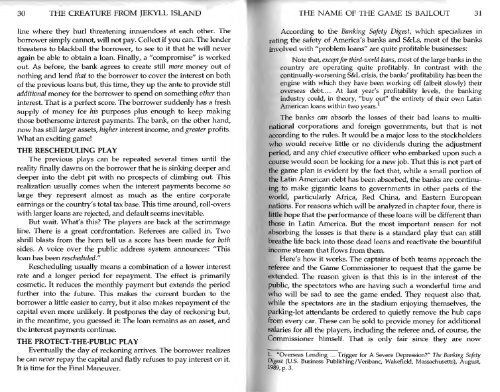Create successful ePaper yourself
Turn your PDF publications into a flip-book with our unique Google optimized e-Paper software.
30 THE CREATURE FROM JEKYLL ISLAND<br />
line where they hurl threatening innuendoes at each other. The<br />
borrower simply cannot, will not pay. Collect if you can. The lender<br />
threatens to blackball the borrower, to see to it that he will never<br />
again be able to obtain a loan. Finally, a "compromise" is worked<br />
out. As before, the bank agrees to create still<br />
more money out of<br />
nothing and lend that to the borrower to cover the interest on both<br />
of the previous loans but, this time, they up the ante to provide still<br />
additional money for the borrower to spend on something other than<br />
interest. That is a perfect score. The borrower suddenly has a fresh<br />
supply of money for his purposes plus enough to keep making<br />
those bothersome interest payments. The bank, on the other hand,<br />
now has still larger assets, higher interest income, and greater profits.<br />
What an exciting game!<br />
THE RESCHEDULING PLAY<br />
The previous plays can be repeated several times until the<br />
reality finally dawns on the borrower that he is sinking deeper and<br />
deeper into the debt pit with no prospects of climbing out. This<br />
realization usually comes when the interest payments become so<br />
large they represent almost as much as the entire corporate<br />
earnings or the country's total tax base. This time around, roll-overs<br />
with larger loans are rejected, and default seems inevitable.<br />
But wait. What's this? The players are back at the scrimmage<br />
line. There is a great confrontation. Referees are called in. Two<br />
shrill blasts from the horn tell us a score has been made for both<br />
sides. A voice over the public address system announces: "This<br />
loan has been rescheduled/'<br />
Rescheduling usually means a combination of a lower interest<br />
rate and a longer period for repayment. The effect is primarily<br />
cosmetic. It reduces the monthly payment but extends the period<br />
further into the future. This makes the current burden to the<br />
borrower a little easier to carry, but it also makes repayment of the<br />
capital even more unlikely. It postpones the day of reckoning but,<br />
in the meantime, you guessed it: The loan remains as an asset, and<br />
the interest payments continue.<br />
THE PROTECT-THE-PUBLIC PLAY<br />
Eventually the day of reckoning arrives. The borrower realizes<br />
he can never repay the capital and flatly refuses to pay interest on it.<br />
It is time for the Final Maneuver.<br />
THE NAME OF THE GAME IS BAILOUT 31<br />
According to the Banking Safety Digest, which specializes in<br />
rating the safety of America's banks and S&Ls, most of the banks<br />
involved with "problem loans" are quite profitable businesses:<br />
Note that, exceptfor third-world loans, most of the large banks in the<br />
country are operating quite profitably. In contrast with the<br />
continually-worsening S&L crisis, the banks' profitability has been the<br />
engine with which they have been working off (albeit slowly) their<br />
overseas debt... At last year's profitability levels, the banking<br />
industry could, in theory, "buy out" the entirety of their own Latin<br />
American loans within two years.<br />
The banks can absorb the losses of their<br />
bad loans to multinational<br />
corporations and foreign governments, but that is not<br />
according to the rules. It would be a major loss to the stockholders<br />
who would receive little or no dividends during the adjustment<br />
period, and any chief executive officer who embarked upon such a<br />
course would soon be looking for a new job. That this is not part of<br />
the game plan is evident by the fact that, while a small portion of<br />
the Latin American debt has been absorbed, the banks are continuing<br />
to make gigantic loans to governments in other parts of the<br />
world, particularly Africa, Red China, and Eastern European<br />
nations. For reasons which will be analyzed in chapter four, there is<br />
little hope that the performance of these loans will be different than<br />
those in Latin America. But the most important reason for<br />
absorbing the losses is that there is<br />
not<br />
a standard play that can still<br />
breathe life back into those dead loans and reactivate the bountiful<br />
income stream that flows from them.<br />
Here's how it works. The captains of both teams approach the<br />
referee and the Game Commissioner to request that the game be<br />
extended. The reason given is that this is in the interest of the<br />
public, the spectators who are having such a wonderful time and<br />
who will be sad to see the game ended. They request also that,<br />
while the spectators are in the stadium enjoying themselves, the<br />
parking-lot attendants be ordered to quietly remove the hub caps<br />
from every car. These can be sold to provide money for additional<br />
salaries for all the players, including the referee and, of course, the<br />
Commissioner himself. That is only fair since they are now<br />
1- "Overseas Lending ... Trigger for A Severe Depression?" The Banking Safety<br />
Digest (U.S. Business Publishing/Veribanc, Wakefield, Massachusetts), August,<br />
1989, p. 3.


